Saudi Arabia Invites Yemen's Houthis To Riyadh For Peace Talks
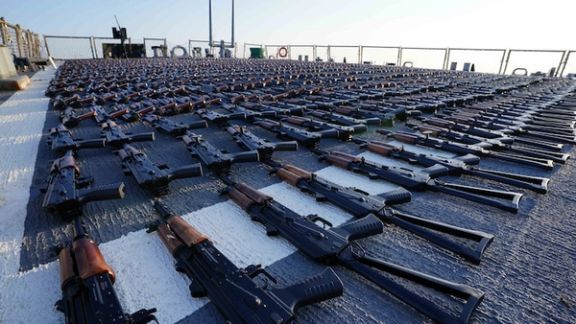
Saudi Arabia invited Yemen's Iran-backed Houthis to Riyadh to continue ceasefire talks, the state news agency SPA reported on Thursday.

Saudi Arabia invited Yemen's Iran-backed Houthis to Riyadh to continue ceasefire talks, the state news agency SPA reported on Thursday.
The kingdom wanted to resume efforts helped by Oman to "reach a permanent and comprehensive ceasefire in Yemen and a sustainable political solution acceptable to all Yemeni parties," SPA added.
Mohamed Ali al-Houthi, head of the Houthi supreme revolutionary committee, said late Thursday that talks were continuing between Sanaa and the Saudi Arabia with Omani mediation.
The discussions included "paying salaries of the Yemeni employees, opening airports and ports, releasing all prisoners and detainees, the exit of foreign forces, and reconstruction leading to a comprehensive political solution," he said.
The Houthi al-Masirah TV reported earlier on Thursday that a delegation left Sanaa and was on its way to Riyadh to continue the negotiations.
The trip will be the first official visit by Houthi officials to the kingdom since the war broke out in Yemen in 2014, after the Iran-aligned group ousted a Saudi-backed government in Sanaa.
The peace initiatives have gained momentum since arch-rivals Saudi Arabia and Iran agreed to re-establish ties in a deal brokered by China. A permanent ceasefire in Yemen would mark a milestone in stabilizing the Middle East.
The first round of the Oman-mediated consultations between Riyadh and Sanaa, which are running in parallel to UN peace efforts, was held in April when Saudi envoys visited Sanaa.
The group has been fighting against a Saudi-led military alliance since 2015 in a conflict that has killed hundreds of thousands and left 80% of Yemen's population dependent on humanitarian aid.
Reporting by Reuters

Britain, France and Germany will retain ballistic missile and nuclear proliferation-related UN sanctions on Iran, set to expire in October under the 2015 Iran nuclear deal.
Reuters reported in June that European diplomats had told Iran they planned to keep the measures.
"In direct response to Iran’s consistent and severe non-compliance with its JCPoA commitments since 2019, the governments of France, Germany, and the United Kingdom intend to maintain nuclear proliferation-related measures on Iran, as well as arms and missile embargoes, after Joint Comprehensive Plan of Action (JCPoA) Transition Day on 18 October 2023," a spokesperson for the three countries, known as the E3, said in a statement.
European sources had cited three reasons for keeping the sanctions: Russia's use of Iranian drones against Ukraine; the possibility Iran might transfer ballistic missiles to Russia; and depriving Iran of the nuclear deal's benefits given Tehran has violated the accord, albeit only after the United States did so first.
The US withdrew from the accord in May 2018, demanding a tighter nuclear deal and a change in Iran’s regional behavior and ballistic missile program.
Once the US imposed tough sanctions on Iran’s oil exports, Tehran began breaching JCPOA limits on its uranium enrichment. It intensified the violation in early 2021, after the Biden administration announced its readiness to negotiate and return to the JCPOA.
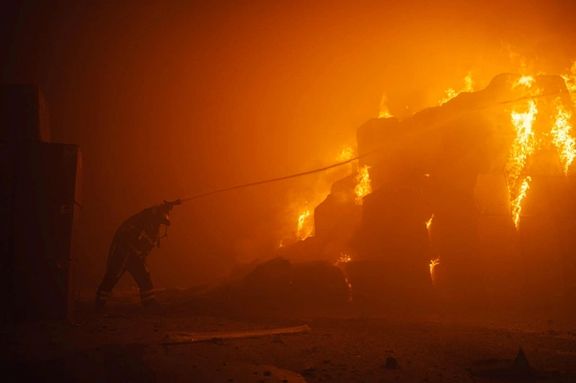
Iran rejected the European decision as "illegal and provocative".
"Undoubtedly, Iran will respond appropriately to this .... action which clearly violates the obligations of the EU, France, Germany and Britain under the JCPOA and the Resolution 2231," Iran's foreign ministry said in a statement, referring to the UN resolution that endorsed the 2015 nuclear pact.
The deal's coordinator, EU foreign policy chief Josep Borrell said he had received a letter from the E3 informing him of their decision and transferred it to Iran, China and Russia, the other participants to the deal.
"As Coordinator, I will consult with all JCPoA participants on the way ahead," he said.
Keeping the sanctions would reflect Western efforts to prevent Iran from developing nuclear weapons and the means to deliver them despite the collapse of the 2015 deal.
It also reflects fears of missile proliferation, with Iran already having supplied hundreds of kamikaze drones to Russia that have targeted infrastructure and cities.
The JCPoA agreed with Iran in 2015 envisaged a "Transition Day" eight years later, when remaining ballistic missile and nuclear-related sanctions on Iran would be lifted.
But Britain, France and Germany will now transfer UN sanctions on Iran that are due to be lifted next month into domestic law, while Britain and the EU will retain existing sanctions, Britain's Foreign office said in a statement.
The crux of the JCPOA pact, which Iran made with Britain, China, France, Germany, Russia and the U.S., limited Tehran’s nuclear program making it harder for it to get fissile material for a bomb in return for relief from economic sanctions.
As a result of Trump’s withdrawal from the deal and US President Joe Biden’s failure to revive it, Iran could make the fissile material for one bomb in 12 days or so, according to US estimates, down from a year when the accord was in force.
"Our commitment to finding a diplomatic solution remains. This decision does not amount to imposing additional sanctions nor to triggering the snapback mechanism. We stand ready to reverse our decision, should Iran fully implement its JCPoA commitments," the E3 said, referring to a mechanism that would immediately restore all UN sanctions against Iran.
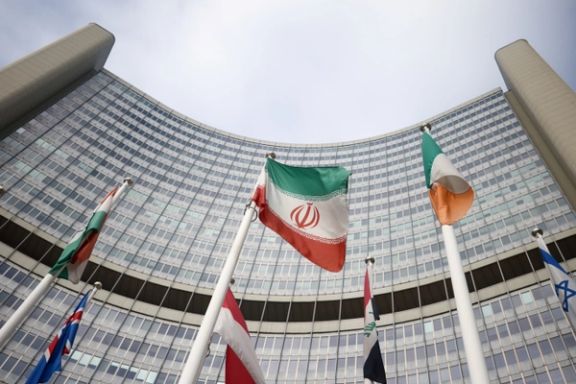
The US and three European allies have warned of another resolution at the UN nuclear watchdog's board in case Iran fails to clarify on uranium traces found at undeclared sites.
Britain, France, Germany -- the so-called E3 -- and the US issued the warning during a quarterly meeting of the International Atomic Energy Agency Board of Governors on Thursday, but they did not specify whether or when they might act on it.
The warning came as the West's standoff with Iran has been complicated by secret US-Iran talks over a prisoner swap agreement and releasing billions of dollars of Iran’s oil revenues frozen in foreign banks due to Washington's sanctions.
A November resolution ordered Tehran to cooperate urgently with the IAEA's investigation into the presence of uranium particles at three undeclared sites, since narrowed down to two.
"If Iran fails to implement the essential and urgent actions contained in the November 2022 Resolution and the 4th March Joint Statement in full, the Board will have to be prepared to take further action in support of the (IAEA) Secretariat to hold Iran accountable in the future, including the possibility of a resolution," the four Western powers said in a statement to the 35-nation IAEA board.
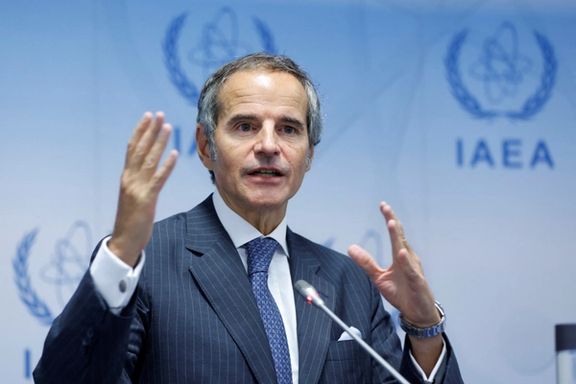
Western powers have recently decried Iran for its lack of cooperation with the IAEA on issues like the re-installation of surveillance cameras removed last year and the enrichment of uranium to levels nearing weapons-grade purity at 60%. However, in parallel, diplomats report that the United States has been engaging in undisclosed "de-escalation" discussions with Iran, potentially complicating matters.
These secretive talks, which Washington has not officially acknowledged, encompass various issues, including Iran's recent reduction in enrichment to 60% purity.
Iran typically reacts to resolutions against it by expanding or accelerating its nuclear activities. Iran maintains that its nuclear program is strictly for peaceful purposes, while Western powers argue that there is no credible civilian explanation for it, particularly uranium enrichment at higher level. The IAEA has never confirmed the peaceful nature of Tehran's nuclear program.
The Thursday joint statement addressed the re-installation of monitoring equipment, such as cameras, but only a fraction of the cameras requested by the IAEA have been installed.
Instead of pursuing another binding resolution against Tehran due to the lack of progress on these issues at this week's IAEA board meeting, Western powers, along with 59 other countries, issued a non-binding joint statement, urging Iran to "act immediately" on various issues, including providing an explanation for the uranium traces.
On the opening day of the IAEA board of governors meeting on September 11, IAEA's Director General Rafael Grossi bemoaned Tehran's failure to respond to IAEA monitoring demands and questions regarding the traces of uranium. He cautioned that his agency is not happy with how relations with Iran progress on the outstanding nuclear issues.
Despite remarks by Grossi, Nasser Kanani, the spokesman for the Iranian Foreign Ministry, said Iran and the IAEA have made “considerable progress” in boosting cooperation based on the March agreement.
“It’s a regret that England, Germany, France and the US, which have certain motivations and positions against Iran, have made Iran-IAEA technical cooperation a subject of their political moves,” he said, adding that the Western states did this in the name of defending the agency and the safeguards, but they aimed to distort the reality of Iran’s sincere cooperation with the agency.
“Of course this measure is not new and also not surprising. In the previous Board of Governors meeting, they had a similar show in the form of verbal attacks and accusations against Iran,” he said.
For years, the IAEA has tried in vain to verify the nature of Iran’s nuclear activities, as the regime obstructs inspections and dodges questions in what many see as a time-buying tactic.
The Biden administration has so far been reluctant to exert more pressure on Iran over its nuclear program and has instead endeavored to buy the regime’s cooperation with a side deal.
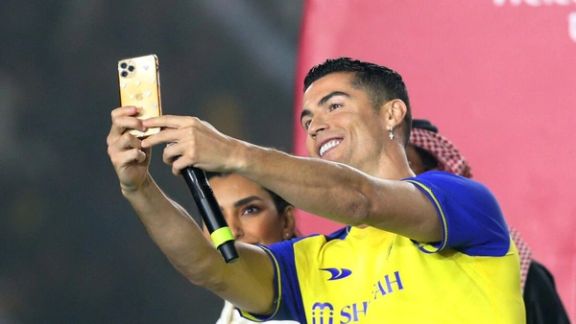
Saudi Arabia has urged Iran to provide unhindered internet access to Cristiano Ronaldo, the renowned footballer playing for Saudi Arabian team Al-Nassr during his stay in Iran.
Access to many international messaging apps and websites are blocked in Iran for both political and religious reasons.
The request comes in response to statements made by Iran's Minister of Tourism and Cultural Heritage, Ezzatollah Zarghami, who emphasized the necessity for Ronaldo to install Iranian domestic messaging apps during his visit to the country.
Zarghami's comments followed remarks made by the CEO of Persepolis Football Club during a live television program, where he discussed providing unfiltered SIM cards to Al-Nassr players traveling to Tehran for a match on September 19.
In the wake of significant reactions within the Persian-speaking online community regarding these statements, the official Saudi Arabian account, communicated in Persian, stating, "For the convenience of international stars and Al-Nassr team members during their time in Tehran, please recommend the best VPN."
The development has sparked discussions online, with some social media users viewing it as a potential source of embarrassment for the Islamic Republic.
During the last twenty years, Iran has implemented stringent internet censorship policies, curbing citizens' access to unrestricted information. This includes the blocking X, Facebook, Instagram and reputable news sources. Nevertheless, these constraints have been bypassed extensively through the widespread adoption of Virtual Private Networks (VPNs) and anti-filtering software.
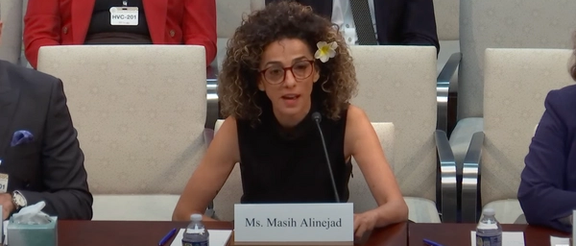
Iranian-American dissident Masih Alinejad says the Biden administration advised her to change her identity and disappear, in light of threats on her life by the Islamic Republic.
Appearing in a US House Foreign Affairs Committee hearing on Thursday, Alinejad revealed that she was offered witness protection, typically offered to people “whose lives are in danger as a result of their testimony against drug traffickers, terrorists, organized crime members and other major criminals,” as stated in the US Marshals Service website.
During the session, titled Iran’s Escalating Threats: Assessing US Policy Toward Iran’s Malign Activities, Alinejad also revealed that earlier this year the White House had warned her of at least 31 threats against her life.
“In an email, the administration strongly advised me to go into witness protection,” Alinejad said. “It means that I have to change my identity… to disappear. This is what exactly the Islamic Republic of Iran wants.”
The State Department is yet to respond to Iran International's request to provide comments on the issue.
The Biden administration has been heavily criticized this week for agreeing to release $6 billion frozen Iranian funds as part of a prisoner swap deal.
The criticism was echoed by some in the House Foreign Affairs Committee hearing, including Congressmen Rich McCormick (R-GA), Mike Lawler (R-NY) and House Foreign Affairs Committee Chair Michael McCaul (R-TX).
Masih Alinejad did also speak against the deal. She censured the Biden administration for showing “weakness” and trying “not to antagonize the ayatollahs”, claiming that the released funds will end up in the IRGC coffers, helping them in their attack on American interests as well as their suppression of the Iranian people.
“The money goes to the ‘morality police’ to kill more Mahsa Aminis,” she said, referring to the 22-year-old Kurdish Iranian woman whose death ignited the Women, Life, Freedom protests.
The rights activists added, “The money goes to the Revolutionary Guards to kill more children in Ukraine. The money goes to the relatives of the ayatollahs to actually promote Sharia laws to oppress more women in Iran.
“We all know that,” she concluded.
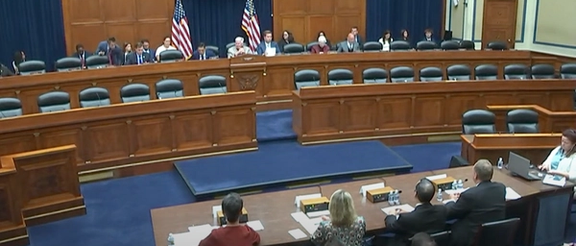
US lawmakers convened Wednesday to examine the Biden administration’s secrecy and “failures” on Iran, calling it a “dangerous” strategy.
The Subcommittee on National Security, the Border, and Foreign Affairs – part of the House Oversight Committee – held the hearing to discuss Washington’s secret dealings with the regime, including Tehran’s nuclear program and negotiations for the release of American hostages in exchange for billions of dollars as well as the circumstances surrounding the dismissal of the Special Envoy on Iran, Robert Malley.
In his opening remarks, Chairman Glenn Grothman (R-Wis) emphasized that the Biden Administration has failed to be transparent with Congress and the American people on talks and actions regarding the Iranian regime. He condemned the White House for a sanctions waiver as part of its prisoner swap on the anniversary of September 11, freeing up $6 billion for “the world’s largest state sponsor of terrorism.”
Decrying the 2015 nuclear deal signed under the Obama administration, Grothman said “the Joint Comprehensive Plan of Action, or JCPOA, was touted by the left as the fix-all to the Iranian nuclear dilemma. In reality, it did little to reign in the Iranian regime while rewarding it with literal pallets of cash.”
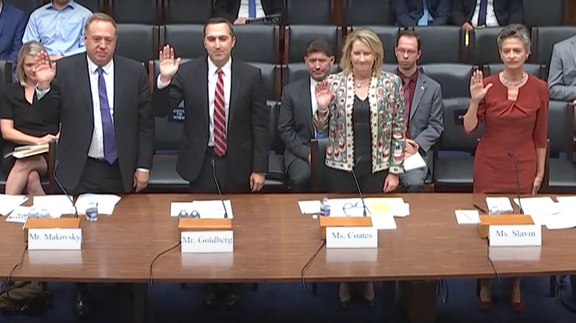
He continued that the Trump administration withdrew the US from the deal “due to Iran’s continued bolstering of its ballistic missile program and its funding of terrorist groups around the globe” and that the current administration has failed to uphold its pledge to return the US to the JCPOA. “Instead, the administration has negotiated in secret and has failed to be transparent” despite the Iran Nuclear Agreement Review Act’s expansive disclosure requirements.
“In March 2023, the International Atomic Energy Agency detected enriched uranium particles at 83.7 percent, prompting great concern as weapons grade uranium is enriched at 90 percent or higher. In addition to its nuclear program, Iran continues work to perfect its ballistic missile program. In May of this year, Iran unveiled its 4th generation liquid fuel ballistic missile, which can carry a 1,500-kilogram warhead around 1,200 miles,” he pointed out.
Grothman highlighted that “Iran’s Revolutionary Guard Corps, or the IRGC, continues to provide arms, training, and financial support to militias and terrorist organizations in Bahrain, Iraq, Lebanon, Palestine, Syria, and Yemen,” mentioning that the IRGC provides the terrorist organization Hezbollah $700 million a year in assistance.
“Since President Biden took office, Iran or its proxies have attacked US forces in the Middle East almost 100 times,” he noted.
On the prisoner swap deal, he said the White House claims the $6 billion could only be used for humanitarian purposes but Iran says it will decide how to spend the money. He stressed the necessity to “ensure that the increase in ransom payments does not incentivize hostile nations like Iran to continue to kidnap American citizens.”
Referring to the suspension of Iran envoy, Robert Malley, which he called “highly unusual”, he said Malley's career has been marked by a “long history of appeasement toward adversaries of the US, and mentioned his repeated meetings with the terrorist organization Hamas under the Obama administration and Iran’s former Foreign Minister Javad Zarif “to undermine President Trump’s maximum pressure campaign against Iran.”
Speaking as one of the expert witnesses at the hearing, Jewish Institute for National Security of America (JINSA) President Michael Makovsky said the Biden administration has not articulated any strategic goal toward Iran, elaborating that in its National Security Strategy, the administration only outlined a series of policies.
He noted that the administration endlessly pursued diplomacy at the exclusion of other tools, an approach which “even enriches and strengthens the regime ... The administration accepts the regime’s existence, works with it and mutes criticism of its awful human rights abuse.”
The US only retaliated to four of Iran’s nearly 100 attacks on US forces in the region, he said, adding that “Iran has even retaliated against US forces for Israeli actions because it fears Israel and not America." So laxly enforced are the sanctions that is has resulted in a triple rise in Iranian oil export revenues in 2023 in comparison to 2020, Makovsky stressed.
Richard Goldberg -- from the Foundation for the Defense of Democracies – described the recent unacknowledged deal with Iran as “a perilous arrangement negotiated in secret, without congressional oversight or review, in breach of statutory requirements.” Secret talks took place against the backdrop of continued attempts by the regime in Tehran to assassinate former US officials and kidnap or kill Iranian Americans on US soil, he added.
He said that it defies logic to believe that the US is paying $6 billion for five people, making it “a historic hostage ransom payment.” Considering other concessions given to Iran such as a waiver of $10 billion of Iran’s oil money blocked in Iraq and a special drawing rights of the IMF for fiat currency of about $7 billion, and $25 billion of oil revenues through a lax enforcement of sanctions that has led to record high export of oil to China, “this is not a $6-billion deal... this could be at least a $50 billion deal.”
“America is paying Iran’s extortion racket, ceding to Tehran nuclear threshold status just to avoid making tough decisions before next year’s presidential election," he stated.






